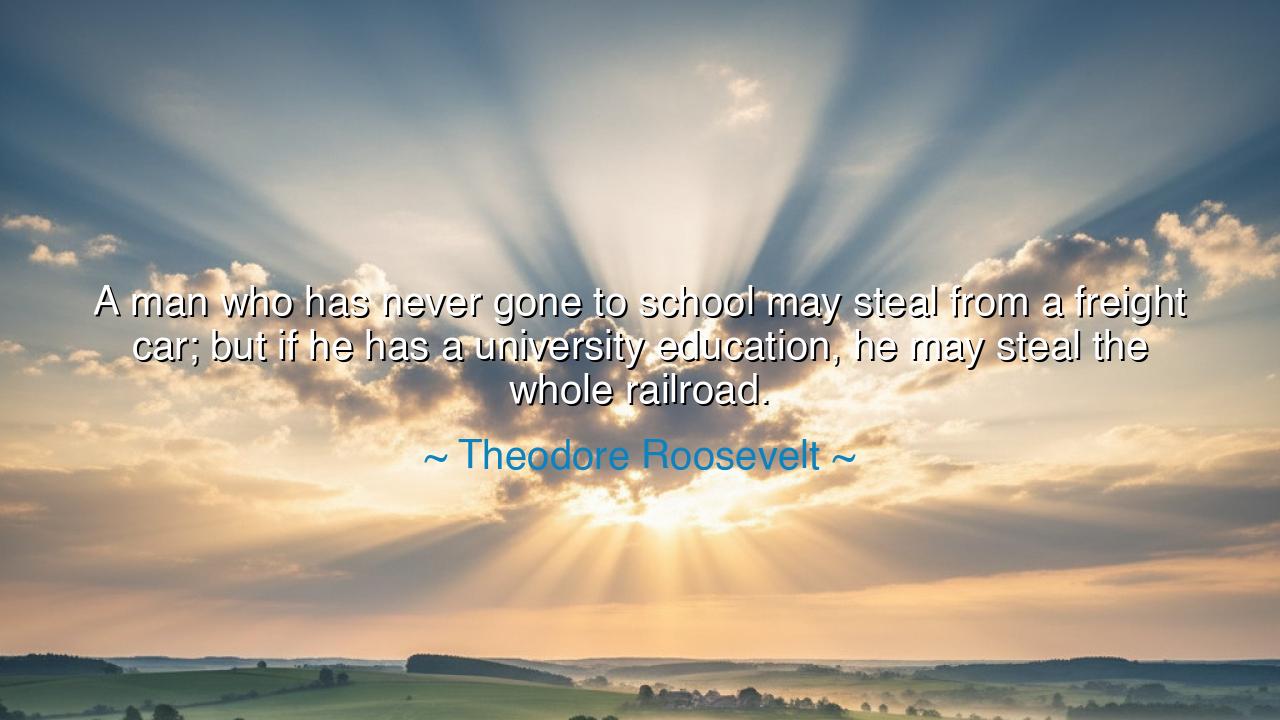
A man who has never gone to school may steal from a freight car;
A man who has never gone to school may steal from a freight car; but if he has a university education, he may steal the whole railroad.






There is a fierce, unflinching wisdom in the words of Theodore Roosevelt, when he said: “A man who has never gone to school may steal from a freight car; but if he has a university education, he may steal the whole railroad.” Beneath this wry observation lies one of the deepest truths about education, morality, and power — that knowledge alone does not make a person good. Education sharpens the mind but does not cleanse the heart. It grants men greater tools, but not always greater virtue. Roosevelt, who spent his life balancing the sword of justice with the shield of intellect, warns us that intelligence without conscience becomes not a blessing, but a weapon.
The words come from an age when Roosevelt, ever the reformer, was battling corruption in the highest echelons of American society. The early twentieth century was the era of the robber barons — men who built empires of steel, oil, and railroads, yet did so through deceit, exploitation, and greed. These were not ignorant men. They were educated, cultured, and calculating. Roosevelt saw that while the uneducated criminal might steal a loaf of bread to survive, the educated criminal could manipulate laws, governments, and markets — stealing not just bread, but the means by which all men earn it. Thus, his quote is both a satire and a prophecy: education, when severed from morality, magnifies vice instead of virtue.
The deeper meaning of this truth lies in the dual nature of knowledge. Like fire, it can illuminate or destroy. The man who learns without wisdom learns only to justify his own desires. Roosevelt understood that education must be yoked to character, or it becomes dangerous. The same mind that can invent medicine can invent poison; the same intellect that can build a bridge can build an empire of deceit. A society that glorifies cleverness above conscience will one day be ruled by those clever enough to appear good while doing great harm. Hence his warning — that the crimes of the ignorant wound the body, but the crimes of the educated wound the soul of a nation.
Consider the example of Bernie Madoff, whose financial schemes in modern times defrauded thousands and shook the world’s markets. He was not a man of poverty or ignorance; he was a man of immense knowledge and social standing. His crime was not the crude theft of a single act, but the elegant deceit of decades. He stole not from a freight car, but from the very railroad of trust that underpins the economy itself. In Madoff’s fall, Roosevelt’s words come alive again, echoing through the halls of history — that education without integrity is not advancement, but regression disguised as progress.
Yet Roosevelt, though stern, was not cynical. His quote does not condemn learning — rather, it calls for moral education alongside intellectual training. He himself was a man of great learning, but greater virtue. He believed that true education teaches not merely how to think, but how to act justly. It trains not only the mind, but the conscience. To produce citizens who can govern wisely, one must first cultivate hearts that love truth more than power. Without this, the university becomes not a temple of enlightenment, but a forge for more sophisticated corruption.
Therefore, his words should stir every generation to reflection. The question is not how much we know, but **what kind of






AAdministratorAdministrator
Welcome, honored guests. Please leave a comment, we will respond soon